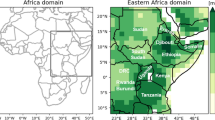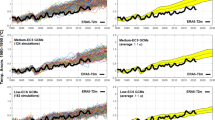Summary
Estimates of the predictability of New Zealand monthly and seasonal temperature and rainfall anomalies are calculated using a cross-validated linear regression procedure. Predictors are indices of the large scale circulation, sea-surface temperatures, the Southern Oscillation Index and persistence. Statistical significance is estimated through a series of Monte Carlo trials. No significant forecast relationships are found for rainfall anomalies at either the monthly or seasonal time scale. Temperature forecasts are however considered to exhibit significant skill, with variance reductions of the order of 10–20% in independent trials. Temperature anomalies are most skilfully predicted over the North Island, and skill is greatest in Spring and Summer in most areas. At the monthly time scale, predictors local to the New Zealand region account for most of the forecast skill, while at the seasonal time scale, skill depends strongly upon “remote” predictors defined over regions of the southern hemisphere distant from New Zealand. Indices of meridional flow over the Tasman Sea/New Zealand region are found to be useful predictors, especially for monthly forecasts, perhaps as a proxy for atmospherically-forced sea surface temperature anomalies. Sea surface temperature anomalies to the west of New Zealand and in the tropical Indian Ocean are also useful, especially for seasonal predictions. Forecast skill is more reliably estimated at the monthly time scale than at the seasonal time scale, as a result of the larger sample size of monthly mean data. While long-term mean levels of skill may be estimated reliably over the whole data set, statistically significant decadal-scale variations are found in the predictability of temperature anomalies. Therefore, even if long-term forecast skill levels are reliably estimated, it may be impossible to predict the short-term skill of operational seasonal climate forecasts. Implications for operational climate predictions in mid-latitudes are discussed.
Similar content being viewed by others
Author information
Authors and Affiliations
Additional information
Received July 18, 1997 Revised April 2, 1998
Rights and permissions
About this article
Cite this article
Francis, R., Renwick, J. A Regression-based Assessment of the Predictability of New Zealand Climate Anomalies. Theor Appl Climatol 60, 21–36 (1998). https://doi.org/10.1007/s007040050031
Issue Date:
DOI: https://doi.org/10.1007/s007040050031




